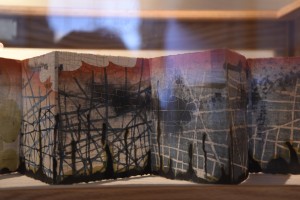City of Flowers, City Without Hope: a Conversation with Dr. Mazin Al-Jadir about Life in Iraq
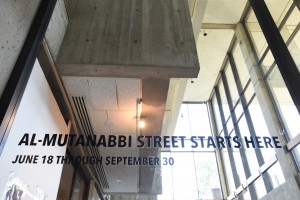
In September, the Harold F. Johnson Library at Hampshire College hosted the second event in a series of programs exploring the themes raised by the traveling exhibit “al-Mutanabbi Street Starts Here.” The informal talk, “Let Me Tell you About Baghdad, the City Where al-Mutanabbi Street is Located” gave the audience the opportunity to learn first-hand about life in Iraq from Iraqi pediatric oncologist Dr. Mazin Al-Jadir. This evening conversation brought to Hampshire was organized by Claudia Lefko, founder of The Iraqi Children’s Art Exchange.
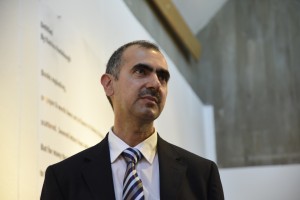
Watch the entire conversation with Dr. Mazin Al-Jadir and Claudia Lefko.
Dr. Mazin Al-Jadiry is a pediatric oncologist at Children’s Welfare Teaching Hospital in Medical City Baghdad, one of the largest cancer facilities in the Middle East. The Baghdad Resolve project partners at the Dana-Farber Cancer Institute in Boston collaborated with the Children’s Welfare Teaching Hospital in Baghdad, and a team of two doctors and two pediatric nurses attended the annual conference of APHON (The Association of Pediatric Hematology/Oncology Nurses.)
Claudia Lefko met Dr. Mazin in 2002. The outcome of their connection is the Iraqi Children’s Art Exchange (ICAE) and their medical project Baghdad Resolve: An International Collaboration to Improve Cancer Care in Iraq. How has children’s art exchange helped their patients? The Iraqi Children’s Art Exchange uses photography, art, and art-inspired projects to advocate for Iraq and for Iraqis. The transcultural project is multifaceted, and multidisciplinary. It sits at the intersection of education and psychology, art and medicine, resilience, psychosocial intervention and children’s rights as articulated in the UN Convention on the Rights of the Child.
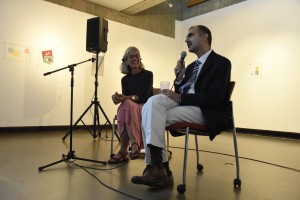
Dr. Mazin reflected on the personal and professional challenges of working with limited resources and ever-growing needs for medical care while living in Baghdad, for many years listed as one of the most dangerous cities in the world.
Here are some of his reflections:
Lives stopped in 1980 when they started wars, when he was 15 years old. If he came [to visit the United States] at age 12, much would be familiar. [Back then,] he would be reluctant to go to school without a flower for a teacher. Now [in Baghdad] you cannot find a flower, or a garden. They are fighting for their lives.
To show the importance of the flower in Iraqi lives, their 800 square metre home included only 200 for the building and 600 for the garden, and its quiet reflection area. As the war progressed, this family had had to convert their garden area into more houses, to hold family. This is what happened in all of Iraq.
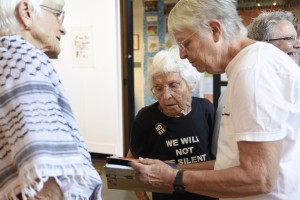
Iraqi children do not have the culture of painting. Gifts to each other are guns. In 2006 Baghdad was the most dangerous. It is better now, but morals have not revived. The spiritual meaning is lost. It is like a chronic illness. Everyone in Iraq has a bad temper. In the morning it is hard, life is insulting, it is a struggling life. There is no more eager listening to the news for better news. Citizens no longer listen to the news at all. They are without hope. Dr. Mazin recalled writing to relatives when there were explosions or bombings, to let them know they were okay. Today, they do not bother to write to their relatives. They simply carry on.
Traveling internationally reminds Dr. Mazin that there is more to life than just eating and working. He can remember music. He stressed that nobody here, in the United States, truly knows what is happening in Iraq, in the Middle East. He tries to explain how hopeless it is, “I have children finishing medical school and I have no answer to their question of “what is next.””
About the Children’s Welfare Teaching Hospital:
One of four large hospitals in the medical city complex, the Children’s Welfare Teaching Hospital in Baghdad hospital has a total capacity of 240 beds. The oncology team Dr. Mazin belongs to sees 60-90 patients daily, and receives 300 newly diagnosed patients per year. They see as many patients as the Dana Farber institute sees. (Note, the Dana-Farber employs more than 4,274 full-time and part-time people, and 467 faculty.) They see every cancer type except for brain cancer. If they did, their number of patients would double. As a result, “there is only 3-4 minutes for each patient. The system is in collapse.”
The budget for the Minister of Health is huge, but the hospital struggles. The hospital receives donations from other doctors, pharmacists, and families. They have to rely on all the legal and illegal ways to get the drugs needed to treat their patients. The Japan Iraq Medical Network (JIM-NET), a Japanese NGO, provides significant humanitarian assistance to support Iraqi cancer children and Syrian refugees in Erbil.
In response to a question about the relation to the current Syrian migration crisis in Europe, Dr. Mazin reflected:
It is a long story of displacement. They thought the best solution was to get out of Iraq. Thousands fled illegally in 2003, and after. In 2003 people began returning to Iraq. Thousands fled again, followed by others. There is a pervasive feeling of insecurity and a desire to get away from a dangerous situation. Dr. Mazin was against leaving the country, being sick from loving the land. Those staying told those leaving, “If you do not return now, we might not need you.” He would tell friends or family that if they do decide to return to Iraq, they will return and will lose their moral spirit. Humanity is being lost.
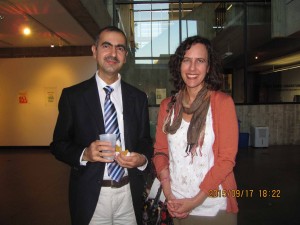
When questioned about libraries, and the possibility of libraries helping maintain culture, education and a community intellectual space, Dr. Mazin turned to Lefko and asked, what are libraries? No one got the joke, not even Lefko. This was his statement on libraries — we do not even remember what they are.
At the end of the conversation, Claudia issued a call for volunteers for a psychosocial intervention for the whole hospital team. The few doctors and the few nurses are besieged by patients and are operating in a city without hope.
As if in harmony with the al-Mutanabbi Street exhibition, and this evening event, at the very same time Dr. Mazin offered these insights, his colleague Salma Hadad attended a Symphony 4 Brahms, with a filled Hall, in a rare event occurring in Baghdad. Salma was moved to see the young and old, the boys and girls and even the musicians, 9 of whom were females.
Would that we could witness in our lifetimes a return to a time of flowers in Iraq.
